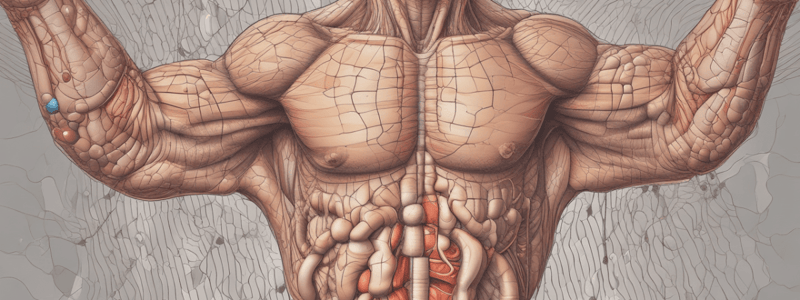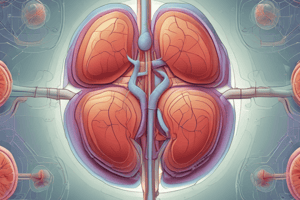Podcast
Questions and Answers
What is the normal serum potassium level?
What is the normal serum potassium level?
3.5-5.0 mmol/L
What is the primary route of potassium excretion?
What is the primary route of potassium excretion?
Through the kidneys
What condition is characterized by a serum potassium level greater than 5.1 mmol/L?
What condition is characterized by a serum potassium level greater than 5.1 mmol/L?
Hyperkalemia
Which of the following can reduce potassium excretion?
Which of the following can reduce potassium excretion?
What is a potential consequence of tissue trauma?
What is a potential consequence of tissue trauma?
What is the typical electrocardiogram (ECG) finding in a patient with hyperkalemia, when the potassium level is around 5.5 mmol/L?
What is the typical electrocardiogram (ECG) finding in a patient with hyperkalemia, when the potassium level is around 5.5 mmol/L?
What is the effect of hyperkalemia on myocardial electrical activity?
What is the effect of hyperkalemia on myocardial electrical activity?
At what potassium level (in mmol/L) does the QRS complex widen and ST depression occur?
At what potassium level (in mmol/L) does the QRS complex widen and ST depression occur?
What happens to the PR interval and P wave at a potassium level of 6.5 mmol/L?
What happens to the PR interval and P wave at a potassium level of 6.5 mmol/L?
What happens to the P waves at a potassium level of 7.0 mmol/L?
What happens to the P waves at a potassium level of 7.0 mmol/L?
What is the terminal arrhythmia associated with hyperkalemia?
What is the terminal arrhythmia associated with hyperkalemia?
What is the serum potassium level defining hypokalemia?
What is the serum potassium level defining hypokalemia?
What are some causes of hypokalemia?
What are some causes of hypokalemia?
What is the normal range of calcium levels in the blood?
What is the normal range of calcium levels in the blood?
What can cause hypocalcemia?
What can cause hypocalcemia?
What is the effect of decreased extracellular calcium on the heart?
What is the effect of decreased extracellular calcium on the heart?
What are the ECG changes seen in hypocalcemia?
What are the ECG changes seen in hypocalcemia?
What are the treatment options for hypocalcemia?
What are the treatment options for hypocalcemia?
What is the effect of calcitonin on calcium levels?
What is the effect of calcitonin on calcium levels?
What is the effect of diuresis on calcium levels?
What is the effect of diuresis on calcium levels?
What is the effect of hypocalcemia on the inflammatory response?
What is the effect of hypocalcemia on the inflammatory response?
What is the primary treatment for hypercalcemia aside from addressing the underlying cause?
What is the primary treatment for hypercalcemia aside from addressing the underlying cause?
In addition to potassium replacement, what other electrolyte may need to be considered for replacement in hypercalcemic patients?
In addition to potassium replacement, what other electrolyte may need to be considered for replacement in hypercalcemic patients?
At what level of calcium does hypercalcemia become a concern?
At what level of calcium does hypercalcemia become a concern?
What is one of the underlying conditions that can contribute to hypercalcemia?
What is one of the underlying conditions that can contribute to hypercalcemia?
How does hypercalcemia affect the QTc interval on an ECG?
How does hypercalcemia affect the QTc interval on an ECG?
What ECG changes are commonly associated with hypercalcemia?
What ECG changes are commonly associated with hypercalcemia?
What ECG changes are associated with pericarditis?
What ECG changes are associated with pericarditis?
What is the cause of ECG changes associated with CNS injury?
What is the cause of ECG changes associated with CNS injury?
What ECG changes are associated with hypothermia?
What ECG changes are associated with hypothermia?
What is the core temperature at which hypothermia can cause ECG changes?
What is the core temperature at which hypothermia can cause ECG changes?
What is the typical ECG finding in CNS injury?
What is the typical ECG finding in CNS injury?
What is the significance of PR depression in ECG?
What is the significance of PR depression in ECG?
What is the effect of excessive sympathetic tone on the ECG in CNS injury?
What is the effect of excessive sympathetic tone on the ECG in CNS injury?
What is the significance of J waves in ECG?
What is the significance of J waves in ECG?
Flashcards are hidden until you start studying
Study Notes
Potassium Regulation
- 98% of potassium is located intracellularly, with 2% in the extracellular fluid
- Normal serum potassium level is 3.5-5.0 mmol/L
- Potassium is mainly excreted through the kidneys, and its excretion can be reduced by factors like adrenal insufficiency
Hyperkalemia (Serum K+ > 5.1 mmol/L)
- Causes: renal failure, adrenal insufficiency, medications affecting the renin-angiotensin-aldosterone pathway, metabolic acidosis, and tissue trauma
- ECG changes:
- 5.5 mmol/L: Tall, narrow peaked T waves
- 6.0 mmol/L: QRS widens and ST depression
- 6.5 mmol/L: PR interval prolongs and P wave flattens
- 7.0 mmol/L: P waves begin to disappear, sine wave is terminal
Hypokalemia (Serum K+ < 3.5 mmol/L)
- Causes: decreased intake, increased gastrointestinal or renal loss, and transcellular shifts
- Treatment: Potassium replacement, consider replacing Magnesium
Calcium Regulation
-
Ca > 10.5 mg/dL: Hypercalcemia
-
Causes: renal disease, hyperparathyroidism, cancer
-
Effects: depresses depolarization and neuromuscular activity, leading to shortened QTc interval
-
ECG changes: bradycardia, widened QRS complex, shortened ST segment, and depressed T waves
-
Treatment: Diuresis, Calcitonin
-
Ca < 8.5 mg/L: Hypocalcemia
-
Causes: chronic renal disease, acute pancreatitis, hypoparathyroidism
-
Effects: decreased myocardial contractility and altered action potential duration, affecting the QTc interval
-
ECG changes: bradycardia, prolonged QTc interval, and flattened or inverted T waves
-
Treatment: CALCIUM GLUCONATE, CALCIUM CHLORIDE
Miscellaneous ECG Changes
- Pericarditis: PR depression, diffuse ST elevation, scooping of the ST segments, and notching of the end of the QRS complex
- CNS Injury: ST depression, T wave inversion, and prolonged QT interval
- Hypothermia: tremor artifact, atrial fibrillation with slow ventricular rate, J waves (Osborne waves), bradycardia, and prolongation of the PR, QRS, and QT intervals
Studying That Suits You
Use AI to generate personalized quizzes and flashcards to suit your learning preferences.




